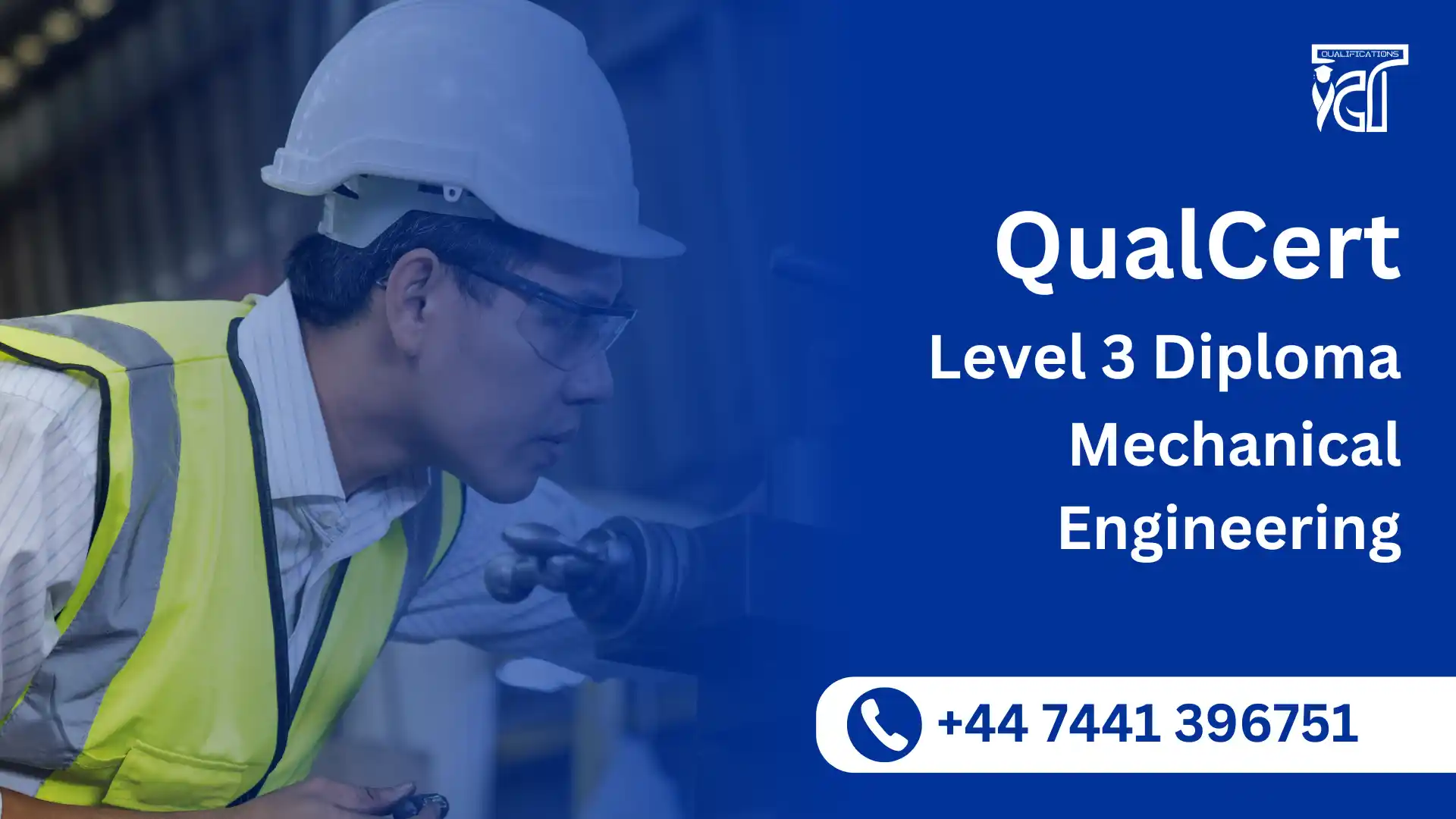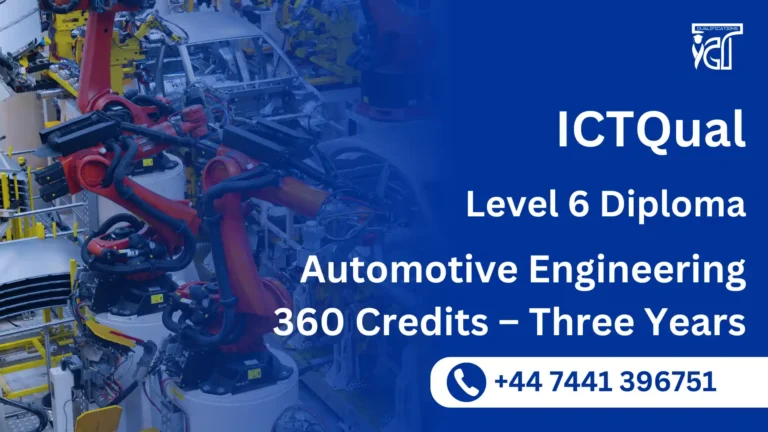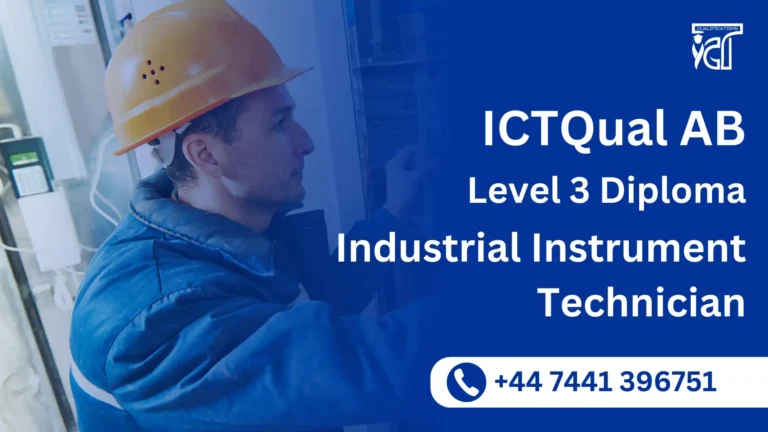The QualCert Level 3 Diploma in Mechanical Engineering is a comprehensive vocational qualification designed to provide learners with the essential knowledge, technical skills, and practical experience required for a successful career in the mechanical engineering industry. This course covers key concepts such as materials science, mechanical design, manufacturing processes, thermodynamics, fluid mechanics, and maintenance of mechanical systems.
Learners will develop an understanding of mechanical principles, engineering mathematics, technical drawing, and the operation of machinery and equipment commonly used in engineering and manufacturing environments. The program emphasizes hands-on training to build problem-solving abilities, fault diagnosis skills, and the safe operation of mechanical systems in line with industry standards.
This diploma is ideal for individuals seeking to enter the mechanical engineering sector, as well as those already working in technical roles who wish to upgrade their competencies and broaden their career opportunities. Upon successful completion, learners will be prepared for various engineering roles or may choose to progress to higher-level qualifications or specialized engineering disciplines.
QualCert Level 3 Diploma in Mechanical Engineering
The QualCert Level 3 Diploma in Mechanical Engineering is a 60 credits qualification with a Total Qualification Time (TQT) of 300 hours, including 210 Guided Learning Hours (GLH). This course is thoughtfully designed to provide targeted and efficient skill development in the field of Mechanical, offering learners a solid foundation to build their expertise.
| Unit Ref# | Unit Title | Credit | GLH | TQT |
| QC03005 – 1 | Engineering Materials Science | 10 | 35 | 50 |
| QC03005 – 2 | Dynamics & Vibration Analysis | 10 | 35 | 50 |
| QC03005 – 3 | Finite Element Analysis & Simulation | 10 | 35 | 50 |
| QC03005 – 4 | Computational Fluid Dynamics (CFD) | 10 | 35 | 50 |
| QC03005 – 5 | Industrial Design & Product Development | 10 | 35 | 50 |
| QC03005 – 6 | Advanced Thermodynamics & Combustion | 10 | 35 | 50 |
GLH (Guided Learning Hours) and TQT (Total Qualification Time) are terms commonly used in vocational qualifications to help define the amount of time a learner is expected to spend on their studies.
1. GLH (Guided Learning Hours)
GLH refers to the number of hours a learner spends being directly taught, supervised, or supported during their course. This includes the time spent in activities such as:
- Classroom instruction
- Practical workshops
- One-on-one tutoring or mentoring sessions
- Online learning sessions with tutor support
In other words, GLH represents the time that learners are actively engaged with their instructors or learning activities.
2. TQT (Total Qualification Time)
TQT represents the total amount of time a learner is expected to invest in completing a qualification, including:
- GLH (Guided Learning Hours): Time spent on direct learning, as explained above.
- Self-Directed Learning: This includes time spent on independent study, research, assignment completion, preparation for exams, and any other work the learner does outside of direct teaching hours.
TQT is a broader measure that includes all the time required to achieve the qualification. It helps learners and employers understand the overall commitment required for the qualification.
Key Differences Between GLH and TQT:
- GLH focuses on direct learning with guidance or supervision.
- TQT includes GLH as well as independent study time and other learning-related activities.
Example:
If a qualification has a TQT of 600 hours and a GLH of 250 hours, it means the learner should spend 250 hours in direct learning (classroom, online, or tutor-led sessions) and 350 hours on independent study or research.
Upon successful completion of the QualCert Level 3 Diploma in Mechanical Engineering, learners will be able to:
- Engineering Materials Science:
- Understand the properties and behavior of different engineering materials, including metals, polymers, ceramics, and composites.
- Apply material selection principles to solve engineering design challenges.
- Analyze material performance in various engineering applications, considering factors such as strength, durability, and cost.
- Evaluate the impact of processing techniques on material properties.
- Understand material failure mechanisms and the role of materials in safety and reliability.
- Dynamics & Vibration Analysis:
- Develop an understanding of dynamic systems and how they respond to external forces.
- Apply principles of vibration analysis to mechanical systems to predict and control vibrations.
- Analyze the dynamic behavior of structures and machinery under various loading conditions.
- Use mathematical models and tools to simulate dynamic systems and vibration response.
- Evaluate damping techniques and their application in reducing undesirable vibrations in systems.
- Finite Element Analysis & Simulation:
- Learn to apply finite element methods (FEM) to solve complex engineering problems related to stress, strain, and deformation.
- Develop skills in using FEM software to simulate physical systems and predict their behavior.
- Analyze the results of simulations to optimize designs and improve material performance.
- Understand boundary conditions, meshing, and solution methods for accurate and reliable simulation outcomes.
- Interpret simulation results to make informed decisions about engineering designs.
- Computational Fluid Dynamics (CFD):
- Gain knowledge in computational techniques for solving fluid flow problems in engineering applications.
- Understand the principles of fluid dynamics and the mathematical models used to describe fluid behavior.
- Use CFD software to simulate fluid flow, heat transfer, and related phenomena in various systems.
- Analyze and interpret CFD results to optimize designs for fluid-related challenges, such as aerodynamics, cooling, and pumping systems.
- Apply CFD to improve the efficiency and performance of mechanical systems in industries like automotive and aerospace.
- Industrial Design & Product Development:
- Understand the principles of industrial design and its role in product development.
- Learn the steps involved in taking a product from concept to manufacturing, including prototyping, testing, and iteration.
- Develop skills in using design tools and software to create detailed product models and designs.
- Apply ergonomics, aesthetics, and functionality in the design process to create user-centered products.
- Understand the challenges and processes involved in translating design concepts into viable commercial products.
- Advanced Thermodynamics & Combustion:
- Gain in-depth knowledge of advanced thermodynamic principles, including the laws of thermodynamics, heat transfer, and energy systems.
- Analyze and design thermodynamic cycles and processes for various engineering applications such as engines, refrigeration, and power plants.
- Understand the principles of combustion and the factors affecting combustion efficiency and emissions.
- Apply thermodynamic analysis to optimize energy systems and reduce environmental impact.
- Develop the ability to assess the performance of combustion engines and other energy conversion devices.
Course Benefits: QualCert Level 3 Diploma in Mechanical Engineering
Comprehensive Mechanical Engineering Knowledge
Gain a solid understanding of mechanical engineering principles, including materials science, mechanical systems design, thermodynamics, and fluid mechanics, providing a strong technical foundation.
Hands-On Practical Skills
Develop essential practical skills in using engineering tools, machinery, and equipment, enabling learners to perform tasks confidently in real-world industrial and manufacturing environments.
Problem-Solving and Analytical Abilities
Enhance critical thinking and analytical skills required for diagnosing faults, improving mechanical systems, and optimizing operational performance in various engineering contexts.
Career-Ready Competencies
Acquire industry-relevant knowledge and techniques that improve employability in sectors such as automotive, aerospace, manufacturing, energy, and construction.
Pathway to Higher Qualifications
Serves as an excellent stepping stone for pursuing higher-level engineering studies, such as Level 4 Diplomas, Higher National Diplomas (HND), or degree programs in mechanical or related engineering fields.
Versatile Job Opportunities
Prepares learners for a wide range of roles, including Mechanical Engineering Technician, Maintenance Engineer, CAD Technician, and Production Engineer.
Understanding of Modern Manufacturing Technologies
Learn about the latest trends, technologies, and innovations in manufacturing and mechanical systems, preparing learners to adapt to evolving industry demands.
Development of Technical Drawings and CAD Skills
Gain competence in interpreting and creating engineering drawings and computer-aided design (CAD) models, which are critical for product design and manufacturing.
Health and Safety Awareness
Understand and apply industry-standard safety practices and risk assessment procedures to ensure safe operation and maintenance of mechanical equipment.
Increased Confidence and Professional Growth
Build self-assurance in performing technical tasks and contribute effectively to engineering teams and projects in professional environments.
This course is ideal for individuals who are:
✔ Aspiring Mechanical Engineers and Technicians
Students or school leavers with a keen interest in mechanical systems, machinery, and industrial design, looking to build a career in mechanical engineering.
✔ Technical and Vocational Learners
Learners with a background in science, mathematics, or technology seeking a practical, skills-focused qualification to enter the engineering field.
✔ Engineering Apprentices
Individuals currently engaged in engineering apprenticeships who wish to formalize and deepen their mechanical knowledge and technical skills.
✔ Entry-Level Industry Professionals
Early-career technicians or machine operators in manufacturing, production, or maintenance roles who wish to improve their theoretical understanding and enhance their career opportunities.
✔ Career Changers with a Technical Aptitude
Adults from non-engineering sectors who have a technical mindset and wish to transition into mechanical or industrial engineering roles.
✔ Problem-Solvers and Tinkerers
Practical, hands-on individuals who enjoy working with tools, solving mechanical problems, building systems, and understanding how mechanical components function and interact.
✔ Learners Planning Further Education in Engineering
Those aiming to pursue advanced studies in mechanical or manufacturing engineering at Level 4 or higher, such as HNDs or engineering degrees.
Entry Requirements
Register Now
Qualification Process
Qualification Process for the QualCert Level 3 Diploma in Mechanical Engineering
- Self-Assessment:
Begin by evaluating your eligibility to ensure you meet the qualification requirements, including work experience, knowledge, and language proficiency. - Registration:
Complete your registration by submitting the required documents, including a scanned copy of a valid ID, and paying the registration fee. - Induction:
An assessor will conduct an induction to confirm your eligibility for the course and explain the evidence requirements. If you do not meet the criteria, your registration will be canceled, and the fee will be refunded. - Assignmnets & Evidence Submission:
Provide all assignmnets and the necessary evidence based on the assessment criteria outlined in the course. If you are unsure of the required evidence, consult with the assessor for guidance on the type and nature of evidence needed. - Feedback and Revision:
The assessor will review your submitted evidence and provide feedback. Evidence that meets the criteria will be marked as “Criteria Met,” while any gaps will be identified. You will be asked to revise and resubmit if needed. - Competence Evidence:
Submit final evidence demonstrating that all learning outcomes have been met. This evidence will be marked as “Criteria Met” by the assessor once it is satisfactory. - Internal Quality Assurance (IQA):
The Internal Quality Assurance Verifier (IQA) will review your evidence to ensure consistency, quality, and compliance with standards. - External Verification:
The IQA will submit your portfolio to QualCert External Quality Assurance Verifiers (EQA) for final confirmation. The EQA may contact you directly to verify the authenticity of your evidence. - Certification:
Upon successful completion of all checks, QualCert will issue your official certificate, confirming that you have attained the QualCert Level 3 Diploma in Mechanical Engineering.







